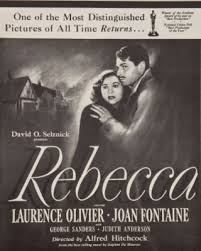
REBECCA
US, 1940, 130 minutes, Black and White.
Laurence Olivier, Joan Fontaine, George Saunders, Judith Anderson, Nigel, Bruce, Florence Bates.
Directed by Alfred Hitchcock.
Rebecca won the Oscar for the best film of 1940. It was Alfred Hitchcock's first American film. Hitchcock had a great reputation in England with such thrillers as The Thirty Nine Steps and The Lady Vanishes. David Selznick wanted him to come to Hollywood. Hitchcock liked America and has lived there for the rest of his life, returning to England to make particular films like Under Capricorn or Frenzy. Hitchcock had just made the film version of Jamaica Inn from the novel by Daphne Du Maurier. Later he was to make The Birds by the same author. Rebecca was a very popular novel at the time and Selznick, who had just finished Gone With The Wind, and knew the public's delight in film versions of popular novels, wanted to make this film. He secured the services of Laurence Olivier who made an impressive dramatic and melancholy hero.
Many tests were done of most Hollywood actresses for the role of the heroine of the film. Joan Fontaine won the role and was perfect in it. She was to win an Oscar under Hitchcock's direction the next year for Suspicion. One of the most memorable characters in Rebecca is Judith Anderson's Mrs. Danvers, the model of sinister housekeepers. George Sanders and Florence Bates were most impressive in the supporting cast. The film is not so much a crime thriller as a romantic melodrama and, to that extent, not so typical of Hitchcock. However, it was appealing in its time and has remained something of an enjoyable classic. Elements of Rebecca have influenced many filmmakers, one of the most notable is Brian de Palma who allows Hitchcock themes and styles to influence such films as Sisters and Obsession. Rebecca is certainly most entertaining.
1. The film is considered a Hitchcock classic. Why? It was 'Best Film of 1941'. What qualities impress now? What qualities seem dated?
2. Hollywood and its film styles of the 40s? Olivier and Fontaine, studio sets, the nature of editing, the musical background, black and white photography?
3. Hitchcock and his reputation? How does this film fit into it and contribute to it?
4. Daphne du Maurier and her romantic novelettes? The quality of this story as romance and as novelettish? Is the story strong? What is its main interest and appeal?
5. The significance of the title and the fact that Rebecca never appears? That she is talked about? How real is her impact? The particular incidents that she lived through? The particular objects that signified her? How real does her personality become? The contrast with Joan Fontaine and her never being referred to by her name? Her taking Rebecca's place, differing from her?
6. The importance of the structure of the film: the dream, the impact of Mandalay, the French locations, the journey, the substitution in love and hate, the climax and the truth? How well was the audience involved in this?
7. How attractive was Joan Fontaine as the heroine? The presentation of her background, her girlishness, her falling in love and worshipping Maxim? The importance of the wedding, her new way of life, her initial embarrassment? Her trying to live the life at Mandalay? Her girlish fears? The importance of the home movies? Her being haunted, the relationship with Mrs. Danvers, the dress? Her being reassured by Maxim? Her supporting him? Her growth from girlishness to womanhood? How rounded a characterization was this? How real a character?
8. The contrast with Maxim? His brooding, Laurence Olivier's performance? The initial melancholy, the falling in love, the using of the girl? The enigma, the mixture of tenderness and aloofness? The anger? The truth? The tricking of the audience? Audience sympathy towards him? The rich man who suffers? Olivier's skill in communicating the character eg. in his narration of Rebecca's death?
9. The malice of Mrs Danvers? Her menace, her devotion, her madness, her relationship with Favell, the melodrama of her death? She is considered the classic 'menacing housekeeper'. The quality of this performance?
10. Favell: Callow, blackmail, his attitude towards Rebecca, to Maxim, the realization of the truth?
11. The complications of the truth? Rebecca’s attitude towards life? The reality of the incidents in the boat, her death? The trick of the other body being found? Audience involvement in this?
12. The contribution of the minor characters for atmosphere, interest: Mrs. Van Hopper, the doctor, the relations? Their contribution to the understanding of Maxim, Rebecca? The irony in these characterizations, eg. Mrs. Van Hopper's snobbery?
13. Comment on the film's attention to detail, of Mandalay, of characterization.
14. The value in the exploration of themes of marriage, love, hatred?